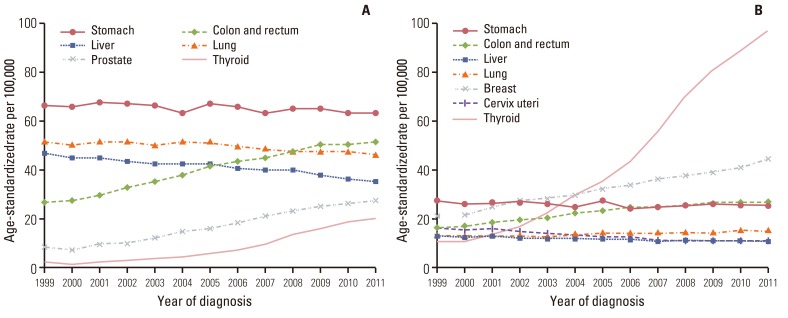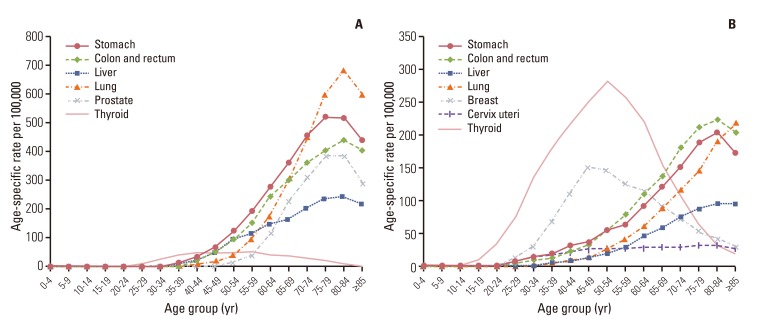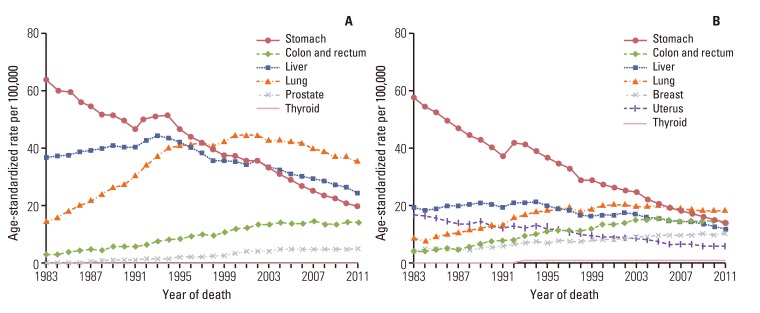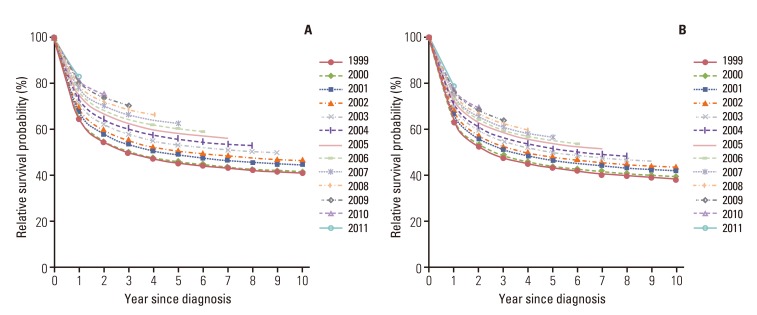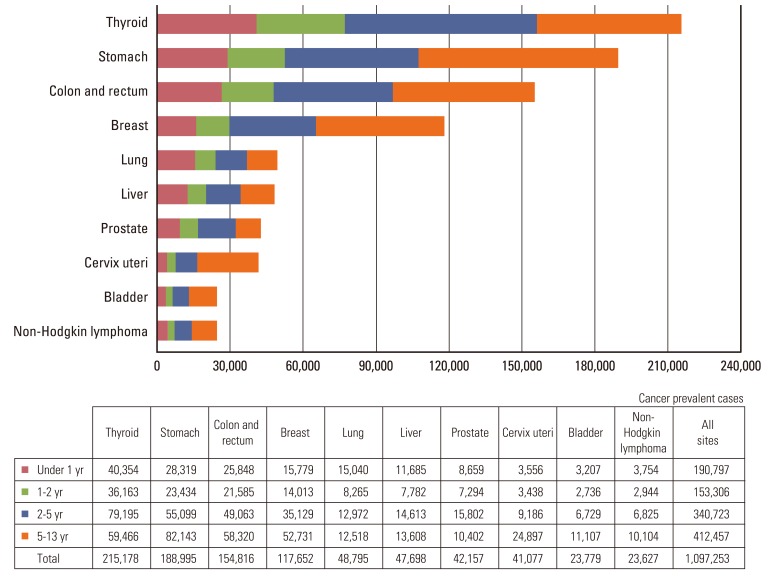Cancer Res Treat.
2014 Apr;46(2):109-123.
Cancer Statistics in Korea: Incidence, Mortality, Survival, and Prevalence in 2011
- Affiliations
-
- 1The Korea Central Cancer Registry, National Cancer Center, Goyang, Korea. astra67@ncc.re.kr
- 2National Cancer Control Institute, National Cancer Center, Goyang, Korea.
Abstract
- PURPOSE
This study aimed to report nationwide cancer statistics in Korea, including incidence, mortality, survival, and prevalence, and their trends.
MATERIALS AND METHODS
Incidence data from 1993 to 2011 were obtained from the Korea National Cancer Incidence Database, and vital status was followed through December 31, 2012. Mortality data from 1983 to 2011 were obtained from Statistics Korea. Crude and age-standardized rates for incidence, mortality, and prevalence, and relative survival were calculated.
RESULTS
A total of 218,017 cancer cases and 71,579 cancer deaths were reported to have occurred in 2011, and there were 1,097,253 prevalent cases identified in Korea as of January 1, 2012. Over the past 13 years (1999-2011), overall incidence rates have increased by 3.4% per year. The incidence rates of liver and cervical cancers have decreased, while those of thyroid, breast, prostate, and colorectal cancers have increased. Notably, thyroid cancer increased by 23.3% per year in both sexes, and became the most common cancer since 2009. The mortality for all cancers combined decreased by 2.7% per year from 2002 to 2011. Five-year relative survival rates of patients diagnosed in the last 5 years (2007-2011) have improved by 25.1% compared with those from 1993 to 1995.
CONCLUSION
Overall cancer mortality rates have declined since 2002 in Korea, while incidence has increased rapidly and survival has improved.
MeSH Terms
Figure
Reference
-
1. Statistics Korea [Internet]. Daejeon: Statistics Korea;2014. cited 2014 Jan 4. Available from: http://kosis.kr.2. Yoon SJ, Bae SC, Lee SI, Chang H, Jo HS, Sung JH, et al. Measuring the burden of disease in Korea. J Korean Med Sci. 2007; 22:518–523. PMID: 17596664.
Article3. Jung KW, Won YJ, Kong HJ, Oh CM, Seo HG, Lee JS. Cancer statistics in Korea: incidence, mortality, survival and prevalence in 2010. Cancer Res Treat. 2013; 45:1–14. PMID: 23613665.
Article4. Shin HR, Won YJ, Jung KW, Kong HJ, Yim SH, Lee JK, et al. Nationwide cancer incidence in Korea, 1999~2001: first result using the national cancer incidence database. Cancer Res Treat. 2005; 37:325–331. PMID: 19956367.
Article5. Ajiki W, Tsukuma H, Oshima A. Index for evaluating completeness of registration in population-based cancer registries and estimation of registration rate at the Osaka Cancer Registry between 1966 and 1992 using this index. Nihon Koshu Eisei Zasshi. 1998; 45:1011–1017. PMID: 9893469.6. Fritz A, Percy C, Jack A, Shanmugaratnam K, Sobin L, Parkin DM, et al. International classification of diseases for oncology. 3rd ed. Geneva: World Health Organization;2000.7. World Health Organization. International statistical classification of diseases and related health problems. 10th rev. Geneva: World Health Organization;1994.8. Segi M. Cancer mortality for selected sites in 24 countries (1950-1957). Sendai: Tohoku University School of Medicine;1960.9. Howlader N, Noone AM, Krapcho M, Garshell J, Neyman N, Altekruse SF, et al. SEER cancer statistics review, 1975-2010. Bethesda: National Cancer Institute;2013.10. National Cancer Institute. SEER*Stat Program, version 6.6.1 [Internet]. Bethesda: National Cancer Institute;2013. cited 2013 Jan 4. Available from: http://seer.cancer.gov/seerstat/.11. Ederer F, Heise H. Instructions to IBM 650 programmers in processing survival computations. Methodological note. No. 10. Bethesda: National Cancer Institute;1959.12. Paul Dickman [Internet]. Stockholm: PaulDickman.com;2014. cited 2014 Jan 14. Available from: http://www.pauldickman.com.13. Davies L, Welch HG. Increasing incidence of thyroid cancer in the United States, 1973-2002. JAMA. 2006; 295:2164–2167. PMID: 16684987.
Article14. Enewold L, Zhu K, Ron E, Marrogi AJ, Stojadinovic A, Peoples GE, et al. Rising thyroid cancer incidence in the United States by demographic and tumor characteristics, 1980-2005. Cancer Epidemiol Biomarkers Prev. 2009; 18:784–791. PMID: 19240234.
Article15. Han MA, Choi KS, Lee HY, Kim Y, Jun JK, Park EC. Current status of thyroid cancer screening in Korea: results from a nationwide interview survey. Asian Pac J Cancer Prev. 2011; 12:1657–1663. PMID: 22126540.16. Kim SY. Study to provide evidence of health screening service for thyroid cancer. Seoul: National Evidence-based Healthcare Collaborating Agency;2012.17. Forman D, Bray F, Brewster DH, Gombe Mbalawa C, Kohler B, Pineros M, et al. Cancer incidence in five continents. Vol. 10 (electronic version). Lyon: IARC Press;2013.18. Jung KW, Yim SH, Kong HJ, Hwang SY, Won YJ, Lee JK, et al. Cancer survival in Korea 1993-2002: a population-based study. J Korean Med Sci. 2007; 22(Suppl):S5–S10. PMID: 17923755.
Article
- Full Text Links
- Actions
-
Cited
- CITED
-
- Close
- Share
- Similar articles
-
- Cancer Statistics in Korea: Incidence, Mortality, Survival, and Prevalence in 2016
- Cancer Statistics in Korea: Incidence, Mortality, Survival, and Prevalence in 2008
- Cancer Statistics in Korea: Incidence, Mortality, Survival, and Prevalence in 2015
- Cancer Statistics in Korea: Incidence, Mortality, Survival and Prevalence in 2010
- Cancer Statistics in Korea: Incidence, Mortality, Survival, and Prevalence in 2013


